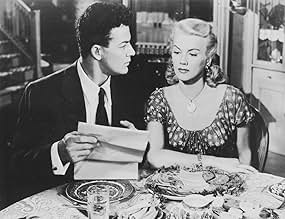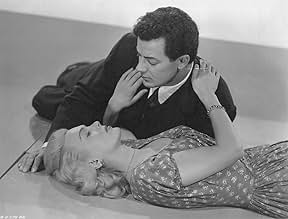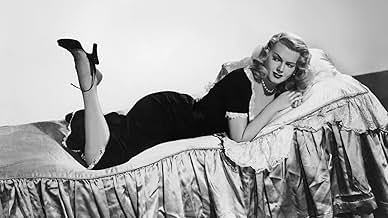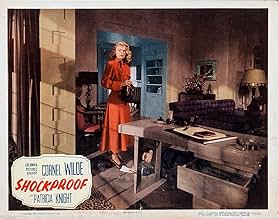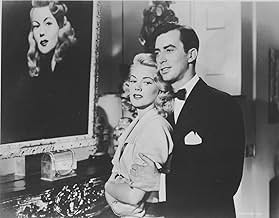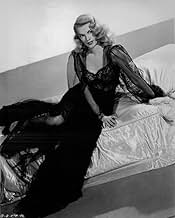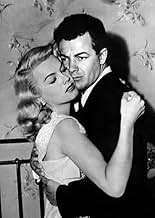IMDb RATING
6.5/10
2.4K
YOUR RATING
A parole officer falls in love with his client, a ravishing blonde who served time for murder, and he's determined to help her go straight despite her interfering criminal boyfriend.A parole officer falls in love with his client, a ravishing blonde who served time for murder, and he's determined to help her go straight despite her interfering criminal boyfriend.A parole officer falls in love with his client, a ravishing blonde who served time for murder, and he's determined to help her go straight despite her interfering criminal boyfriend.
Shirley Adams
- Emmy
- (uncredited)
Gilbert Barnett
- Barry
- (uncredited)
Richard Benedict
- 'Kid' - Knife Wielder
- (uncredited)
Paul Bradley
- Airline Clerk
- (uncredited)
Argentina Brunetti
- Stella
- (uncredited)
Paul Bryar
- Man in Car
- (uncredited)
John Butler
- Sam Green, Pawnbroker
- (uncredited)
Claire Carleton
- Florrie Kobiski
- (uncredited)
Cliff Clark
- Mac - Police Lieutenant
- (uncredited)
King Donovan
- Joe Wilson
- (uncredited)
Al Eben
- Joe Kobiski
- (uncredited)
- Director
- Writers
- All cast & crew
- Production, box office & more at IMDbPro
Storyline
Did you know
- TriviaThis film features the iconic Bradbury Building at 304 S. Broadway as the location of Griff Marat's office. Out of his office window can be seen the old Hall of Records Building at 220 N. Broadway (demolished 1973), which is about 0.4 miles away.
- GoofsAs Griff is taking Jenny to the "restaurant" the same traffic scene of passing cars repeats in the car's rear window.
- Quotes
Jenny Marsh: I'm no longer asking you to say goodbye. I'm just saying it!
- Crazy creditsFollowing the opening credits the camera pans onto the curb edge of the road which reads HOLLYWOOD BLVD.
- ConnectionsFeatured in Behind the Mirror: A Profile of Douglas Sirk (1979)
Featured review
If the movie were an airplane, then it wobbled a lot before finally crashing and burning with an utterly illogical ending. Up to that point, this crime drama is mediocre at best. The best part follows the couple (Wilde and Knight) as they flee the cops after running out on Knight's parole and in the process sinking into society's lower depths. That 20 minute sequence is done with both flair and zip.
Director Douglas Sirk is known for artistic soap opera, so it's not surprising that this film emphasizes the love story over the crime element. The trouble is that Wilde is woodenly uninvolving, while Knight's character remains muddled, to say the least. A key part of the plot lies in tracking her evolving emotions. But that's hard to do since these developments are confusingly portrayed, helped neither by the turgid script nor by Knight's thespic limitations. Apparently cult movie-maker Sam Fuller co-authored some of the screenplay, which, on the face of it, seems hard to believe. Nonetheless, I'm sure he had nothing to do with the ridiculous climax that instead smacks of outside interference of the most thoughtless kind.
Calling this a noir film is, I think, a stretch. It's certainly not filmed as noir, with none of the usual trademark light and shadow. True, the plot contains a number of noirish elements, but Sirk's style doesn't bring these out in recognizably noir fashion. Even so, the many SoCal location shots are both entertaining and appropriate for crime drama. (Too bad we don't get more of the dingy oil field setting, which has definite and exotic noir potential.) But noir or not, this is a rather poorly done crime drama, having neither the force nor the panache of the better examples of the period. With better casting, a more cogent screenplay, and more attention to the oil field, this could have been a memorable film.
Director Douglas Sirk is known for artistic soap opera, so it's not surprising that this film emphasizes the love story over the crime element. The trouble is that Wilde is woodenly uninvolving, while Knight's character remains muddled, to say the least. A key part of the plot lies in tracking her evolving emotions. But that's hard to do since these developments are confusingly portrayed, helped neither by the turgid script nor by Knight's thespic limitations. Apparently cult movie-maker Sam Fuller co-authored some of the screenplay, which, on the face of it, seems hard to believe. Nonetheless, I'm sure he had nothing to do with the ridiculous climax that instead smacks of outside interference of the most thoughtless kind.
Calling this a noir film is, I think, a stretch. It's certainly not filmed as noir, with none of the usual trademark light and shadow. True, the plot contains a number of noirish elements, but Sirk's style doesn't bring these out in recognizably noir fashion. Even so, the many SoCal location shots are both entertaining and appropriate for crime drama. (Too bad we don't get more of the dingy oil field setting, which has definite and exotic noir potential.) But noir or not, this is a rather poorly done crime drama, having neither the force nor the panache of the better examples of the period. With better casting, a more cogent screenplay, and more attention to the oil field, this could have been a memorable film.
- dougdoepke
- Oct 14, 2008
- Permalink
- How long is Shockproof?Powered by Alexa
Details
- Runtime1 hour 19 minutes
- Color
- Aspect ratio
- 1.37 : 1
Contribute to this page
Suggest an edit or add missing content


